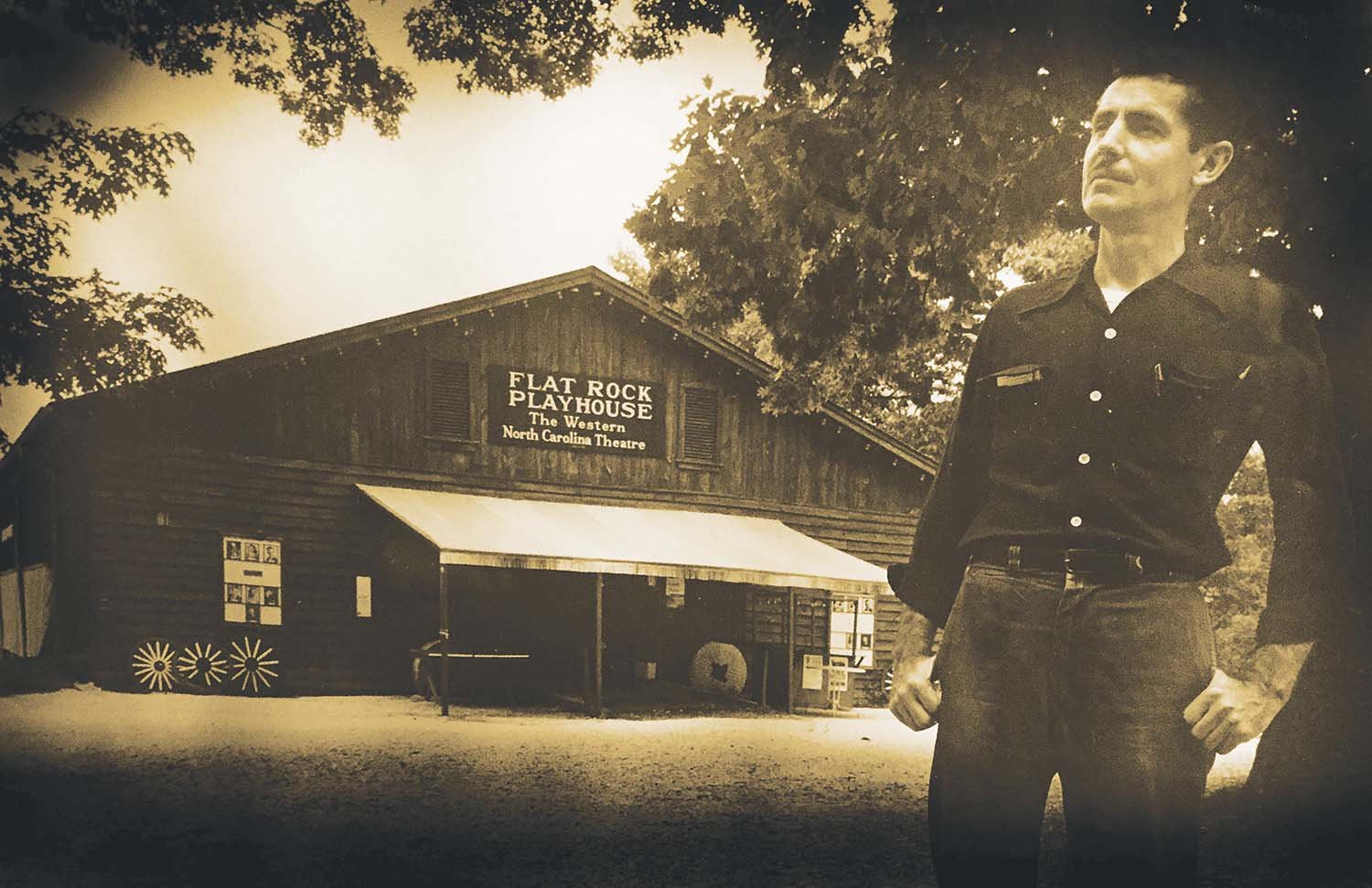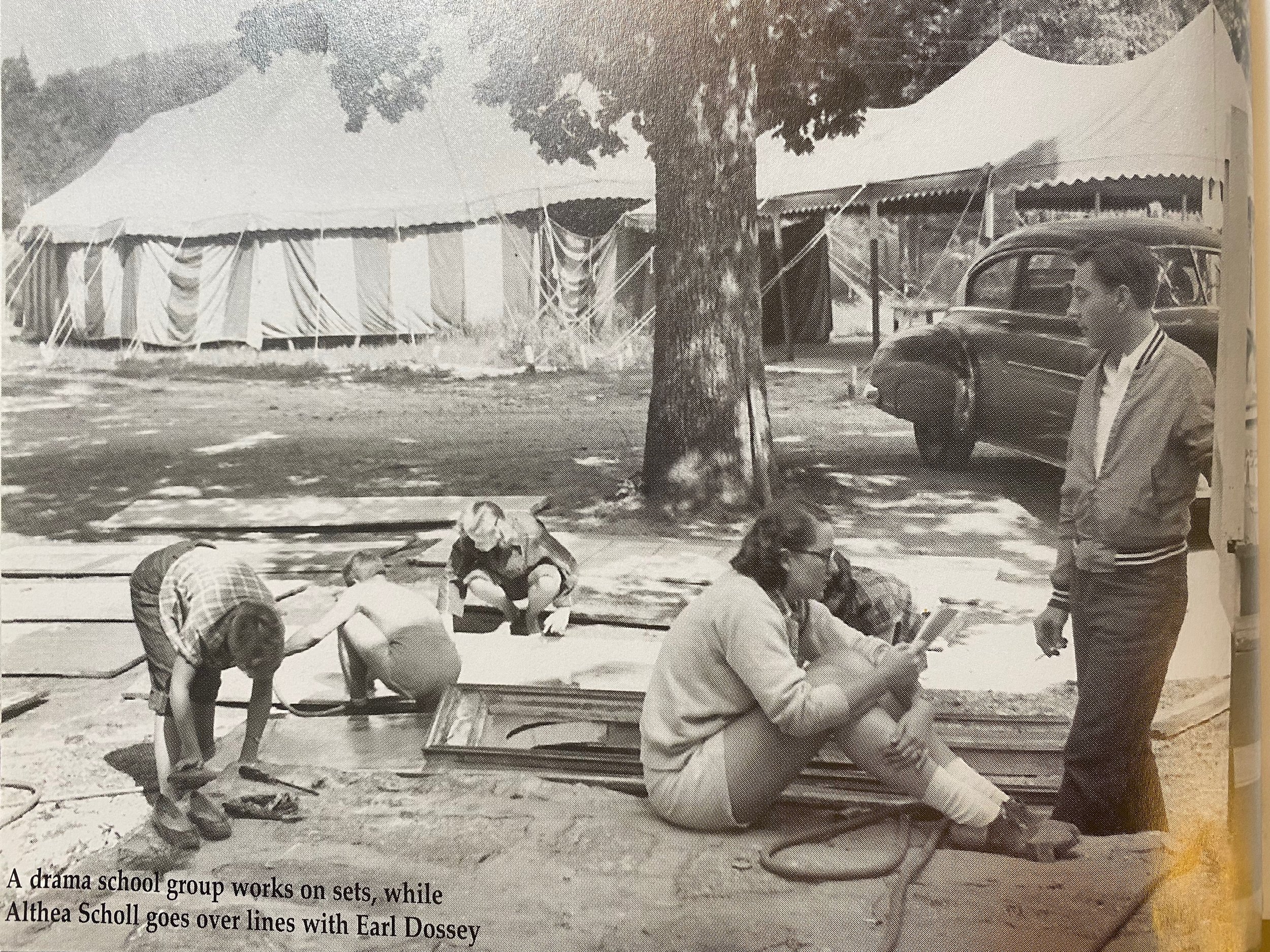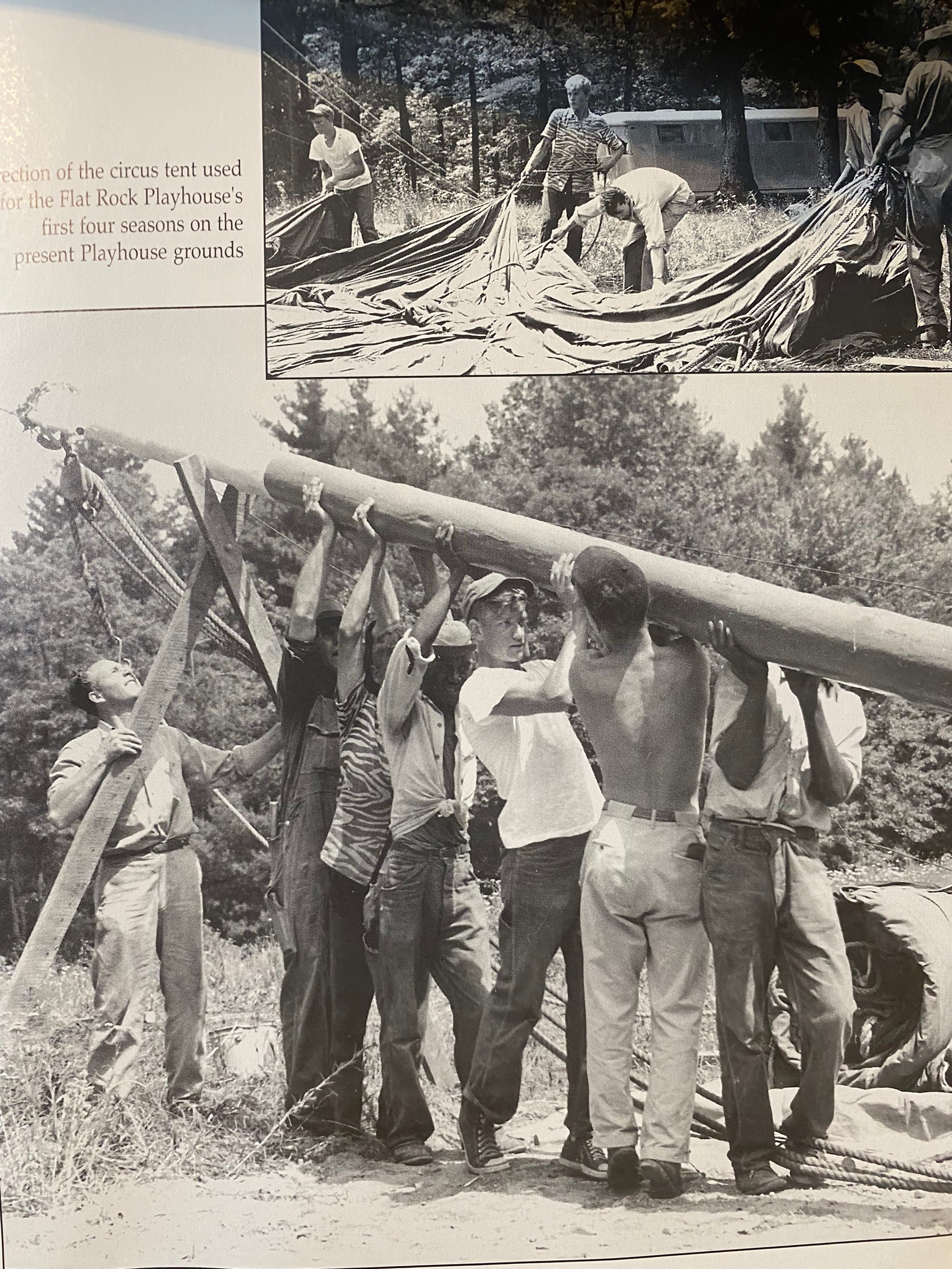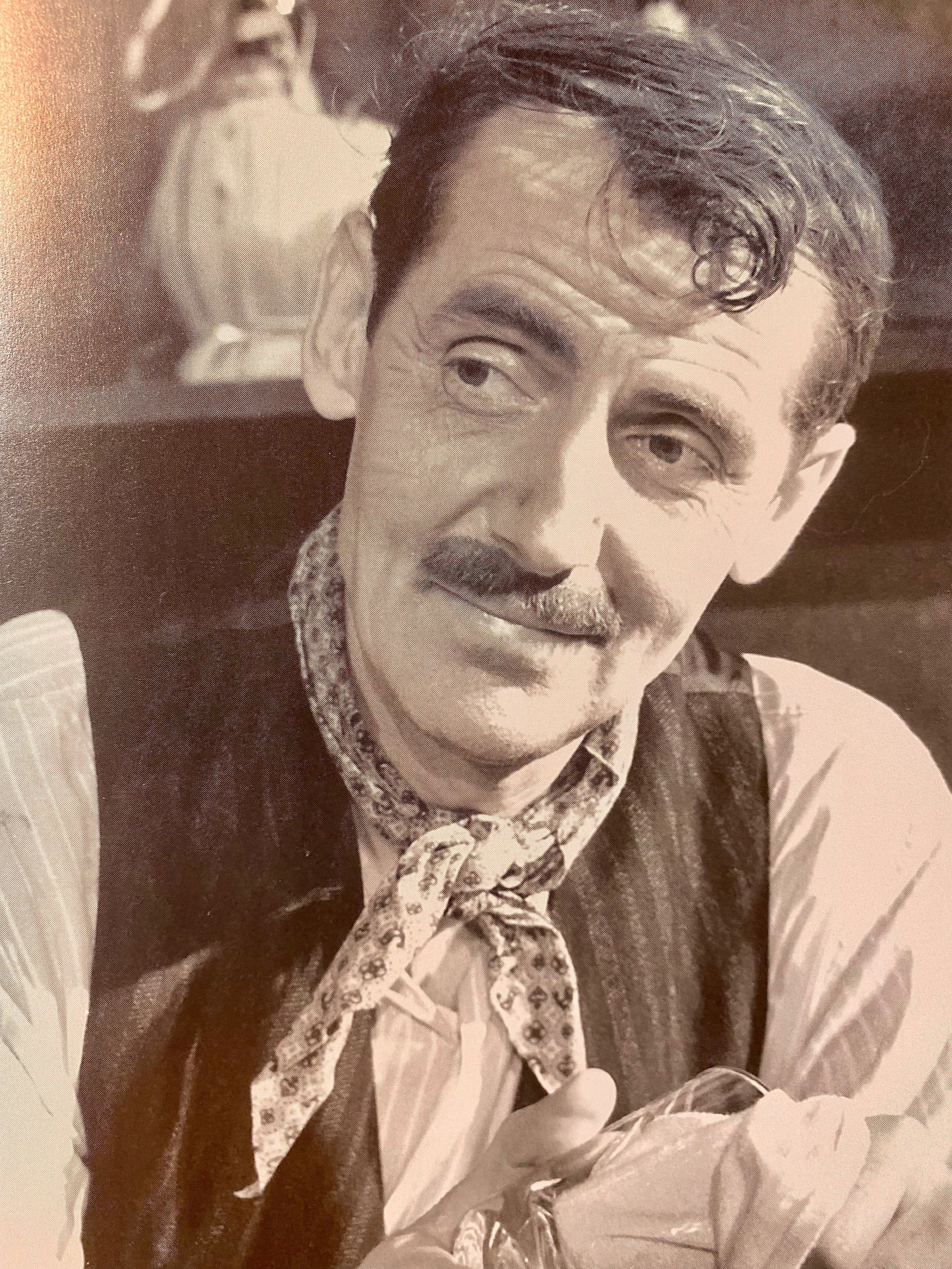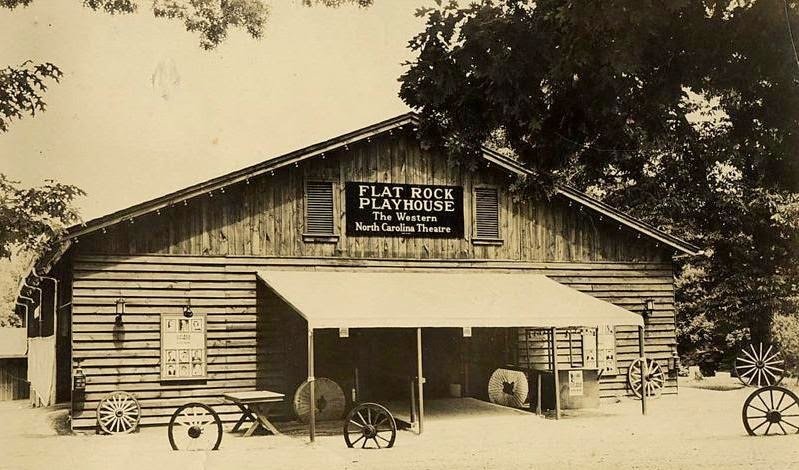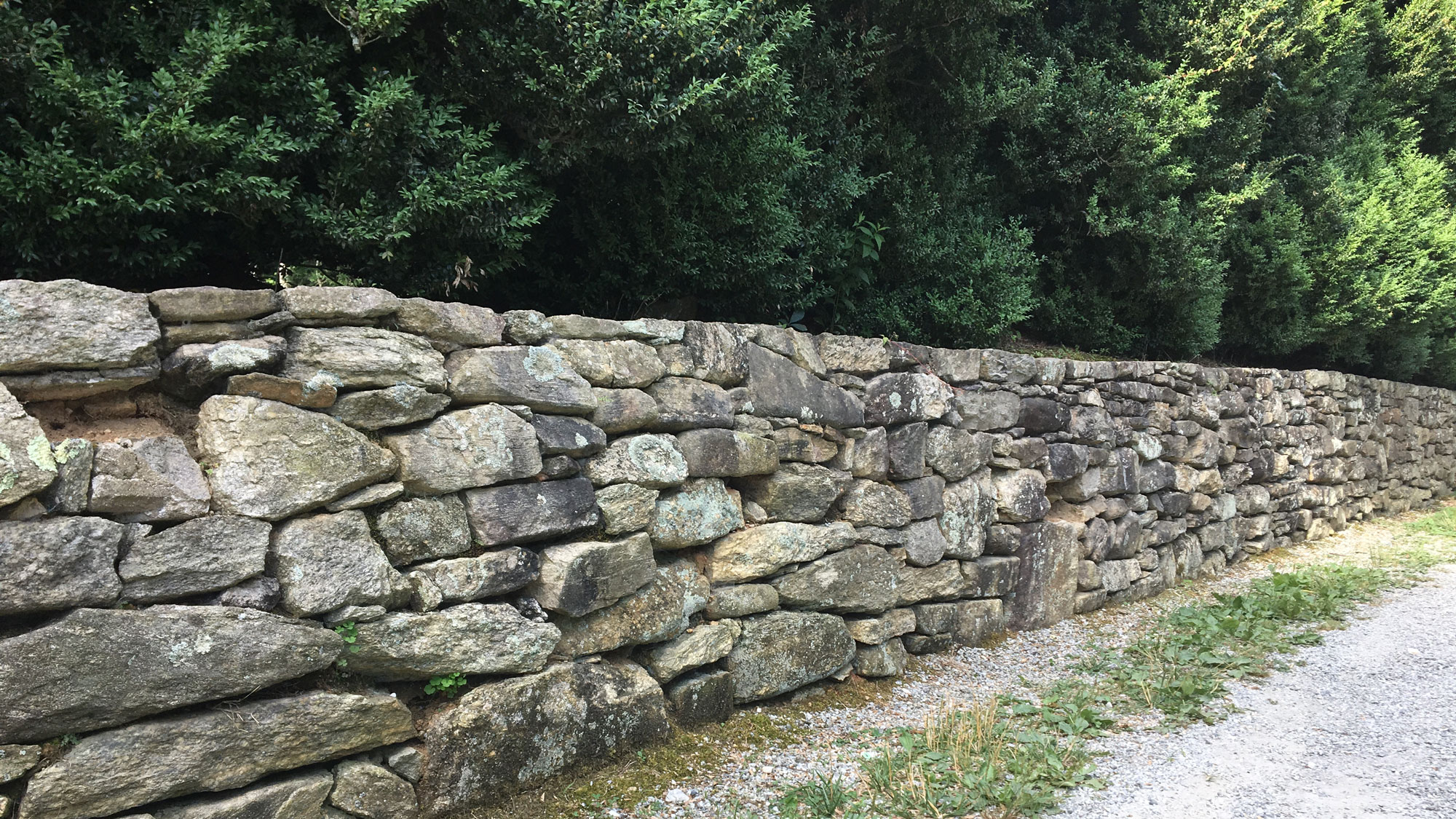Robroy Farquhar; Part II
/This month marks the 39th anniversary of the passing of Robroy Farquhar, founder of Flat Rock Playhouse, on October 5th, 1983.
The following article is primarily excerpted from Louise Howe Bailey’s book, “50 Years With the Vagabonds.” Additional information was provided by the writing of Jennie Jones Giles’ blog “Henderson Heritage” and articles written by Jim Fitzgerald and Rob Stevenson for The Hendersonville Times News. Links and references to their work are provided below.
This article is the second of a two-part series. Part one can be read here and deals with Robroy Farquhar’s first years in Henderson County up until 1951 and the theater troupes that served as the forerunners of Flat Rock Playhouse.
On a Sunday morning in the spring of 1951, Robroy Farquhar, fellow actor Mendel Redish, and Mrs. Ruth Conrad sat on the porch of Conrad’s “Rockworth” home - now known as the Lowndes House - situated beside the “great flat rock” which gives Flat Rock its name.
Robroy and Mendel often talked to Mrs. Conrad about the Vagabond's need of more space and kept emphasizing what a magnificent spot she had for a playhouse. Besides that, there was ample space for housing the cast.
One Sunday morning in the spring of 1951, Robbie, Mendel and Mrs. Conrad sat on The Rock. Mendel remembers "we were drinking coffee and talking, and naturally the Playhouse was the topic of conversation. Presently, "All right,” Mrs. Conrad said, "I agree.“
“50 Years with the Vagabonds”, Louise Howe Bailey
After a dozen years of searching, Robroy Farquhar and the Vagabonds would finally have a permanent home.
Inside the Flat Rock Playhouse tent.
From its humble beginnings decided over a cup of coffee in 1951, Flat Rock Playhouse took root in the rocky ground that surrounded Mrs. Conrad’s Rockworth estate. Under Robroy’s leadership, the nascent theater would steadily grow to become not only one of the finest summer theaters in the land but a highly regarded theatrical teaching institution under the Vagabond School of Drama.
In 1952, tent theater and carnival man Joseph W. McKennon hauled a 50 by 85-foot tent from West Texas which the Vagabond Players pitched on the present site of Flat Rock Playhouse. According to McKennon, the first year for the Vagabond Players was a logistical and financial challenge. "It was almost a total disaster the first season,” he said. "I was on the Board of Directors in the early days, but since they were using my tent, they paid me a rental which was fairly small per week. I ended up giving it all back.”
“The second season I put my foot down,” recalled McKennon. “I said that unless Robroy hired a business manager I was going to take my tent back.” McKennon also reported that the early years in Flat Rock required Robroy and his troupe to cut corners and scramble for the funds to survive. “They stayed through the winter as caretakers in area hotels. They made it off the concessions so they could eat in the winter,” added McKennon.
Jody Barber, who owned a camera shop on Main Street in Hendersonville recalled Robroy’s unconventional techniques for promoting the new theater. “He always participated in events of the town by dressing as a vagabond, more or less a costume of a tux with a red bandanna bag on a walking stick,” explained Barber. "His heart was always in it.”
In 1956, the Playhouse took another step forward when the theater trustees put up $5000 to purchase the property that had been leased from Mrs. Conrad. “On top of this gigantic step,” Robroy wrote to a friend, “the trustees authorized the building of a new permanent roof structure to replace the old tent - with no inside posts to block the view.”
The original wooden stage which McKinnon built in 1953 lasted through 20 years of improvements until an entirely new structure was built of steel and concrete block in 1973. With the addition of the permanent roof, it was possible to install a sloping floor and upholstered reclining theater seats. Robroy said, “It has been so wonderful to enjoy this new and permanent structure, and to gain relief from the uncertainties and trials of the tent theater.”
Robroy also developed the "Be a Brick, Buy a Brick” capital campaign used to raise money for the theater. At intermission of performances, ushers would walk down the sides of the theater holding a clothesline that dangled over patrons with paper bricks attached to clothespins. Patrons would reach up and fasten bills to the clothes pins and tear off the numbered bricks used to select winners of the drawing held at the end of the performance.
As the clothesline slowly worked its way to the back of the theater, Robroy stood on stage - occasionally with his cat Snodgrass on his shoulder - and explained how the money would be spent to benefit the theater. As a result of such fundraising efforts and Robroy’s unwavering commitment to his dream, the tent that was pitched in 1952 was gradually transformed into today's air-conditioned, 700-seat playhouse.
By 1960, the Actors Equity Association classified the Flat Rock Playhouse as the most successful summer theater in America.
———-
Robroy Farguhar’s dream was unshakeable. With tireless work and unflagging optimism he had overcome seemingly impossible situations, and by the late 50s he’d brought acceptance and an appreciation of the legitimate theater to the western North Carolina mountain community.
And his Vagabonds were on the go. When the summer season closed, they were on tour across the southeast.
With the increasingly popular summer theater seasons, the NC General Assembly officially designated Flat Rock Playhouse as the State Theater of North Carolina in 1961- only the third theater to receive such a designation in the United States. -LHB
Boyce A. Whitmire, a Henderson County state legislator (and later Hendersonville mayor) authored a special resolution to designate the Playhouse the official state theater of North Carolina. The resolution passed through the General Assembly in 1961 and Whitmire credited, Robroy with the accomplishment. ”He was about 99% responsible for it. It wasn't my idea but I thought it would be good for the area.”
Whitmire admitted that in 1959 the General Assembly had originally offered to make Flat Rock Playhouse the State Theater of western North Carolina, but Robroy’s vision was grander and he passed on the offer. “We said, ‘forget it,’” laughed Whitmire.
In those early years, running the theater soon became intertwined with the Farquhar family. When Leona Farquhar was pregnant with their son, Robin, she remembers Mr. Farquhar was unable to go with her to the hospital. He had to stay behind and learn his lines for a play he was about to perform.
The Playhouse and acting company eventually outlasted the Farquhars’ marriage. In 1962 the Farquhars were divorced, but the two remained close – with Leona Farquhar continuing to work at the theater and serving as the residence manager. Despite the divorce, Leona would later say, “I've been more married to Robbie since we were divorced than when we were married.”
Christmas letters written to friends and out-of-town Vagabonds reflect the busy schedule Robroy followed through the 60s and early 70s. “I’ve just returned home with the Vagabond touring theater. Another N.C school tour completed, presenting for the fourth consecutive year, The World of Carl Sandburg. We traveled 3711 miles and played to audiences totaling 47,000.
As dedicated as he was to the theatre, Robroy was only an occasional actor. He simply didn’t have time to learn his lines due to all his administrative duties.
————
Dennis C. Mauldin, who serves as the Resident Scenic Designer at Flat Rock Playhouse, met Robroy when he arrived in Flat Rock as an apprentice following his freshman year at UNC-Chapel Hill in 1967. Dennis remembers Robroy as a charming although somewhat eccentric man.
“He always wore black pants, a white shirt, a black pen in his shirt pocket, black tie, black hair, the pen usually leaked in his pocket,” recalls Dennis. “He had strict rules which we apprentices were always trying to break. We had a 12-midnight curfew and I remember him walking around with a flashlight saying, “Young Vagabonds ought to be in bed by now. Time’s up. Big day tomorrow!”
Dennis also found Robroy to be generous in spirit. “He wanted it to be a safe place where people could practice their craft without feeling exploited. He didn’t micromanage and he built the playhouse on a philosophy of “growing our own.” He’d bring you in and allow you to grow and evolve. That’s exactly what happened to me and so many others. I learned immensely from him.””
——-
Robroy’s son Robin later recounted “that beautiful day” in the fall of 1983, when his dad took a drive into South Carolina. “He was very much at peace. He knew the Playhouse was on the right track and another good year was closing on his dream come true.” That night, October 5th, 1983, Robroy Farquhar passed away and was discovered the following morning in his apartment on the Playhouse campus. Although no cause of death was listed in subsequent newspaper reports, Robroy lived with the complications of diabetes for many years.
The 73-year-old Englishman who turned a tent show into the North Carolina State Theater left a legacy of magic to actors, acquaintances, and theater-goers during his 44-year association with Henderson County
“Mutt” Burton, a fixture onstage at the Playhouse related a conversation with Robroy as the 1970s came to a close.
“We’ve had our triumphs and our trials, but most of the years have been good ones. They have been rich, not with money, but with wonderful people and experiences. We have had the rewarding experience of adding pleasure and laughter to the lives of millions of people.” -LHB
"Robbie was too good to be true,” said Joseph McKennon, "I don't know anyone who didn't love him, and it's hard to say that about another man. "Making money wasn't his strong point, producing good theater was.”
"The thing that was most conspicuous about his character was his complete devotion to theater and especially to his theater, "said Burton,
At the time of his death, North Carolina Governor James Hunt, Jr. lamented the loss of an iconic figure in theater. “His memory and his work on behalf of North Carolina will last as a living monument,”
Leona Farquhar, his former wife, said she asked her husband in 1948 about his dreams. He replied he “would like to have his theater designated the state theater and he would like a home base for the theater group, a school of theater, a touring company, and a theater building he could use year-round. He turned those dreams into reality.”
“When we got married, I asked him what he wanted, and he's accomplished everything,” she said, “How many people realize their dream in a lifetime?”
Sources:
“50 Years With The Vagabonds by Lousie Howe Bailey.
Henderson Heritage Blog. Jennie Giles Jones. https://hendersonheritage.com/robroy-and-leona-farquhar/
“Flat Rock Playhouse Founder Left a Legacy of Magic” by Rob Stevenson reporter Times-News. Link
“Robroy Farquhar Dies at Age 73”, by Jim Fitzgerald; Reporter Times-News. Link






